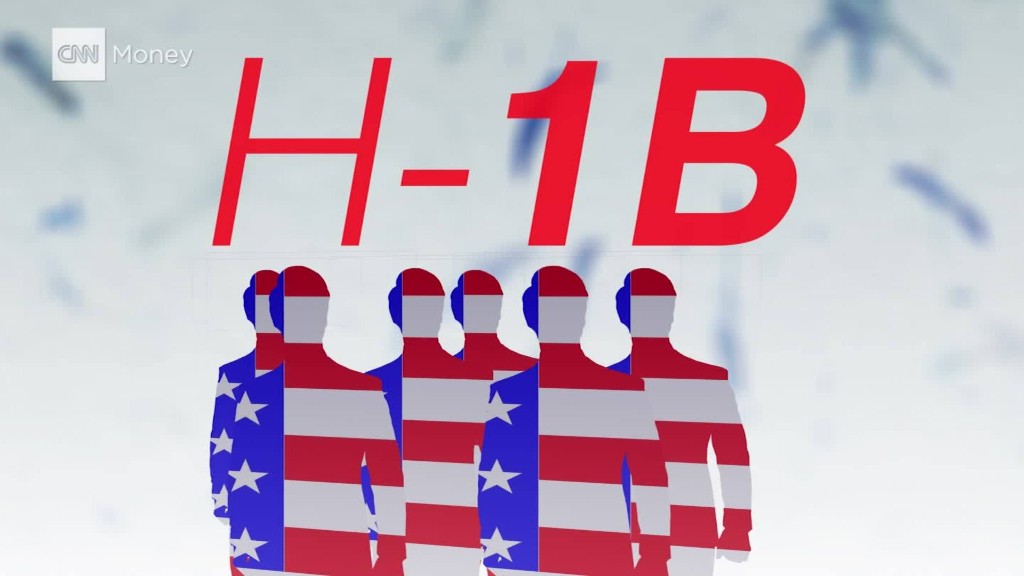
A popular visa program may soon get a makeover.
Employers say H-1B visas are crucial because they allow foreign workers to fill skill gaps in the American workforce. Foreigners are in hot pursuit of them, too: Last year demand was three times more than the annual limit of 85,000.
But critics of the program say some outsourcing firms exploit H-1B visas to hire foreign workers. They contract them to work for big companies who end up paying them less than Americans would make for the same jobs.
For years, lawmakers have been debating proposals to change the program. Now a window might be opening. President-elect Donald Trump has said he wants to crack down on misuse of visas, though he has not detailed how.
Rep. Darrell Issa, a California Republican, introduced a bill this week that he says will punish outsourcing companies.
Under his legislation, any company paying H-1B workers less than $100,000 would have to show they couldn't hire Americans for the same jobs.
Existing law has a similar requirement but sets the threshold at $60,000, a level established in 1998, and doesn't apply to foreign workers with master's degrees. Issa's bill would do away with that exemption.
The idea is to make it more expensive and complicated for companies to use H-1B visas, and to hurt companies that exploit the program.
Issa's bill, like the current law, would apply only to companies with more than 50 employees and for whom H-1B workers make up at least 15% of the workforce.
Related: Uncertainty over Trump's immigration policy leads foreign engineers to ditch startups
The bill addresses Trump's concerns about high-skilled immigration, says Neil Ruiz, a specialist in migration and economic development at George Washington University Law School.
"This bill shows the direction of where they may go in immigration reform: Let people in -- but make sure you're protecting American workers and set the bar high," he said.
The visa has special significance for Silicon Valley because the tech industry is worried about attracting and retaining foreign engineering talent. Tech industry advocates have lobbied for years to increase the number of visas to meet the growing demand.
Rep. Zoe Lofgren, a Democrat who represents Silicon Valley, says Issa's legislation is inadequate and won't stop outsourcing.
"It's just a fig leaf," she told CNNMoney.
Lofgren has drafted a more comprehensive bill that would award visas by which employers offer the highest salaries. Under both the current system and Issa's proposal, visas are awarded by lottery, even after companies go through all the paperwork.
"That would avoid this program undercutting the wages of American workers," she said. "It lets the market forces work."
Related: Trump's crackdown on 'visa abuse': Experts weigh in
Lofgren says she plans to introduce her bill within weeks. It will also propose changes to how permanent visas are awarded, eliminating limits allocated by country. Lofgren believes that this will help clear up some of the high demand for H-1B visas, which she said is, in part, due to long wait lists in countries like India. H-1B visas are for three years and can be renewed for three more.
"Trump has said he's against outsourcing. If he is, he can take a look at this bill that could actually work," she said. "If he's not serious, there's nothing I can do about it."
Calvin Moore, a spokesman for Issa, said his bill, originally introduced last year, is a good entry point for reform.
"The point of the bill is to be a modest reform on the pieces of H-1B reform that we think have the most buy-in and that we think are most achievable early in the Congress," he told CNNMoney.
Plenty of industries outside Silicon Valley rely on the H-1B visa program. Foreign journalists, doctors, professors, models, sports coaches and even zookeepers compete for them.
Employers are all required to pay, at minimum, the prevailing wage for the job, which ranges depending on skill level, job description and where the job is.
Immigration lawyers are waiting to see whether changes will take effect before the upcoming H-1B season. The government begins accepting applications April 1.

